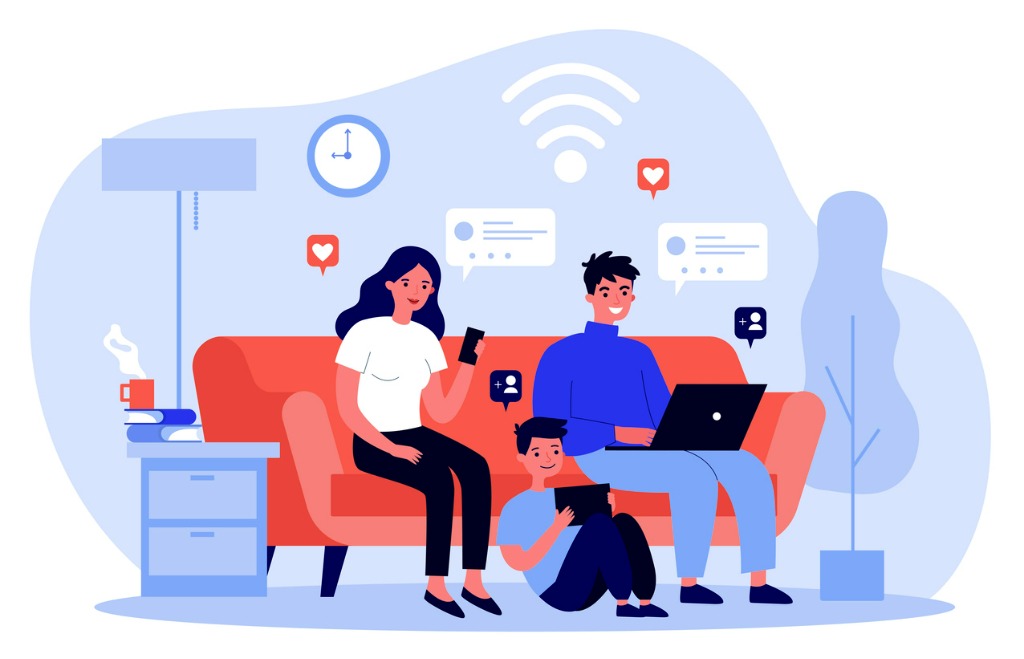Online Bullying – The Guide 2022. 11 things UAE parents can do to protect kids from cyber-bullying.
UAE parents leaving children alone or unmonitored with digital devices during the pandemic has led to a sharp uptick in cyber-bullying and online harassment, according to a leading Middle East doctor. “I’m now seeing significantly more cases where a child has experienced cyber-bullying, harassment and even blackmail,” says Dr Ateeq Qureshi, psychiatrist at the Priory Wellbeing Centre, Dubai and Abu Dhabi. “The starting point of safer internet use is always parental awareness about their children’s online activities and non-judgmental communication with the individual child or teenager.”
Research across the world shows how common it is for children under 12 to use social media, while a 2020 study found that there was a 70% increase in hate between children and teens in online chats, and a 40% increase in toxicity on popular gaming platforms during the pandemic. Unlike in-person bullying, cyberbullying can occur 24/7 and has a stronger association with suicidal ideation. Victims of cyberbullying are also more than twice as likely to engage in self-harming behaviours than non-victims.
This Anti-bullying Week Dr Qureshi and other internet-safety experts are urging UAE parents to pay more attention to their children’s online activities to protect kids from cyber-bullying. “It’s crucial parents have some level of awareness and oversight in an age-appropriate manner to be able to support their children’s safety.”
How much do you really know about what your child does online?
The internet is so much a part of our day-to-day lives now that it’s easy to forget about its sinister side. Yes, the world wide web connects us and gives access to an infinite mine of knowledge and opportunity. But it also exposes children to a vast and sleepless virtual universe populated by trolls, predators and cyber-bullies. And children – even older teens who might seem very digitally savvy – are not born naturally equipped to navigate it safely.
“Children are usually more technologically skilled than their parents. This can lull them and their parents into thinking that they are always capable of making good judgements in their online activities,” explains Dr Quereshi. But children’s cognitive abilities are still developing, so their ability to make complex judgements is underdeveloped: “Children and young people are also much more impulsive and more prone to seeking instant gratification than adults are.”
Curious tweens and teens are now exploring all of the same relationships and boundaries that their parents once navigated in their own youth – except instead of needing to physically go to a school, park or mall or speak on the phone in order to explore them, they are always just fingertips away from 24-hour access to a never-ending Pandora’s box of novelty, excitement and temptation. “Hardly any parent would allow their child to have unfettered access to all these things in the physical social world. Despite the three decades that the internet has been a part of people’s lives, many parents still regard it as somehow ‘not real’. However, for young people, it is just as real as the physical environment.”
This why it’s so important for parents to be aware of the age restrictions of certain apps and games – and enforce them – says Dr Quereshi.
“A large majority of the children I see in our clinic do not adhere to basic age guidelines while watching TV or accessing content online. Many children simply falsify their date of birth to obtain access to social media apps and websites, with parents often unaware and sometimes complicit.”
Children also need to be made aware of the dangers of sharing personal information online, and encouraged to maintain an open and non-judgmental dialogue with their parents or teachers in case they do make a misjudgement of this kind.
“Sharing personal information or content – messages, photos or videos – online is also common, yet, worryingly, can sometimes result in serious repercussions.”
Young people being blackmailed and threatened with sensitive images or messages that they’ve been lured into sharing with an online ‘friend’ is one of the most common problems that anti-cyber-bullying expert Barry Lee-Cummings of Beat the Cyber Bully comes across these days. They are often too embarrassed to confide in their parents, unsure of how to manage the dilemma, and can be led into sharing even more compromising content in an unsuccessful effort to stop the manipulator.
Even aside from cyber-bullying, children can be exposed to inappropriate content or conversations that they might not be emotionally mature enough to handle. Many video games also have chat or communication functions which a lot of parents don’t have knowledge of or don’t pay enough attention to. Children and teenagers often interact with strangers, and they need to have the knowledge and support to manage these in a safe way.
Dr Ateeq believes that for many parents the problem is a combination of them simply lacking in knowledge and understanding about the associated dangers of the internet, in addition to being too passive when it comes to monitoring their child’s internet usage.
“Parents and carers may feel their young child is ready for Instagram, Facebook or TikTok despite all of these apps having a clear age limit of 13 years or higher. However, the limits are there because most children do not have the cognitive and emotional abilities to deal appropriately with all the content that they might encounter on these sites.”
11 Ways to protect children from cyber-bullying
While there are countless benefits to the digital world for young people, there are also many risks that both parents and children and teens need to become familiar with and equipped to deal with. Here are some tips to help parents protect their children from cyber-bullying and keep them safe online:
Enforce age restrictions
Age ratings are there for a reason – to protect your children and allow them to thrive. While the Children’s Online Privacy Protection Act (COPPA) set an age-appropriateness rating of 13+ years for social media sites in 1988, many experts now argue this age-rating may not be enough to limit some of the risks now associated with the internet due to advancements over the last few years. Dr Ateeq is keen to emphasise how a ‘blanket’ age rating should only ever act as a guide. “Minimum age ratings are generally a good starting point in thinking about safe use, with the primary function to protect children and young people while also enabling them to thrive in the online environment. However, it’s also important to highlight how two children of the same age do not have the same cognitive and emotional abilities.
Watch, play and browse together
Active participation in your child’s online world is crucial. While parents can often see kids’ and teens’ internet gaming or social media as something unfamiliar and ‘over their heads’, parents should make an effort to understand them, and ideally participate in it with them. “Shared discovery from an early age helps increase parents’ awareness of the type of content their child is accessing,” says Dr Quereshi. “It also helps the child not to regard the parent as a clueless outsider in their online world. This is also very helpful further down the line as children get older, allowing conversations in a cooperative, rather than an adversarial manner.”
Get savvy about seemingly innocent apps
It’s not just the obvious and well-known apps and games that can pose a risk to kids. Any online destination that supports video chat with strangers is the most risky sort of site for young people to be interacting with, according to Barry Lee-Cummings of Beat The Cyber Bully. Some destinations that fall into this category are Holla, Chatous, Omegle, BitLife, Hippo, MeetMe, Sweet Chat and Telegram. Look for these on your child’s digital device, or monitor their search engine use for these key words, and if they are there be aware that it could be time for a conversation about them. Other apps of concern include Yubo, Hoop and Wink. The games and apps that pose a risk are constantly changing – download Beat The Cyber Bully’s app, CoBabble, to be kept up to date with the latest technology that parents should be aware of.
Download and use specialist parental control software
While many devices come with in-built monitoring software, these can be limited and easy for older kids to circumvent. Some more sophisticated, external monitoring software that can enable parents not only to see what their child is looking at but also delete unwanted apps, block inappropriate content, and alter restrictions for different children across multiple devices include: iKydz, Nischint and Circle.
But monitor with respect
Monitoring your child’s internet use is a key part of protecting them from cyber-bullying online, but it’s also vital that it’s used as part of a coherent strategy that includes encouraging open and non-judgemental discussions about internet use. Dr Quereshi says: “It is important to monitor your child’s internet use in an age appropriate manner and being respectful of a child’s privacy. This should not be a licence to snoop on your children but to do the minimum necessary to ensure safety.”
Engage and communicate in a non-judgmental way
As children get older, they will likely be able to circumvent any restrictions you try to set for them. This is why it is so important to talk to your children about their internet use and nurture an ongoing, regular line of open communication on topic; one single conversation is not enough. Help them understand that you are not against online activities, but want to be involved and supportive as they navigate this vast and ever-changing, virtual ‘world’. Educate them about the dangers of sharing photos, sending intimate messages and interactions with strangers. Let them know that you – or another trusted adult – are always available to talk, and that you will not punish them or ban their devices if they slip up in any way while online.
Keep devices in a common area
Especially for younger children, the UAE’s digital Safety Portal experts recommend that digital devices are always used either in a common area or while with an adult – never alone in their room.
Avoid live streams
Live streaming hugely increases a child’s risk of being exposed to inappropriate content. Even seemingly innocent sites such as Instagram and Facebook have live streaming facilities, and it is advisable that parents warn children against accessing these.
Check your child’s digital footprint
If you are concerned about your child’s internet use or possible cyber-bullying, you can try searching for them online regularly on different search engines to check on his or her ‘online reputation’. The UAE’s digital safety portal recommends checking for your child’s full name, alongside personally identifiable information such as a hometown or phone number. Also check for common misspellings of your child’s name. Try searching on Google Images too – you could even set up a Google Alert to send you an alert whenever content about a specific name is posted online.
Agree family rules
Families should explain and agree rules around internet use with their children. These rules can include: what sites or apps can be used; duration and timing; sharing of personal information and content; if and how to interact with strangers; as well as how to treat other people. These will help to keep children safe as well as encouraging them to be good online citizens.
Role model positive digital behaviour
If we’re on our own phone and gadgets all the time at home, we shouldn’t be surprised to find our children “glued” to tvs and ipads, according to the UAE’s digital safety initiative. Give your kids positive examples of how to use technology for good purposes that benefit you and others, such as listening to an audio book, or writing a blog post about your favorite recipe. Encourage your family to set aside digital detox days. set an example, and be the first to put your phone and digital devices away to spend quality time with the family outside the house.
Be aware of your own online sharing and privacy settings
In these days of social media, its’ become commonplace for parents to proudly share photos of their children. But be aware that children have a right to privacy, and any image of your child shared online can potentially be taken and adapted or misused by anybody. Ensure your social media privacy settings are up to date, and never share any sensitive personal information about your child that could end up being searchable online and becoming a part of their online footprint – including their full name and date-of-birth, or the school they attend.
Signs your child could be a victim of cyber-bullying
According to Engage Education, the following might indicate that a child could be suffering from cyber-bullying:
- Low self-esteem
- Changes in mood, including depression, anger or shyness
- Changes in personality, including misbehaving in class
- Changes in appearance, including losing weight or dressing differently
- Social withdrawal, both from family and friends
- Signs of self-harm
- Protectiveness over their phone/laptop
- Suffering performance at school
- School refusal or truancy
What to do if your child is a victim of cyber-bullying in the UAE
Engage Education has the following advice for both parents and teachers who think a child in their care could be a victim of cuber-bullying:
- Instruct your child not to respond – although this can be extremely difficult if the bully is using offensive language and/or spreading lies, ultimately they are looking for a reaction. Replying to a cyberbully only encourages them and this will escalate the situation for the victim
- Document evidence of the cyberbullying – often children do not report cyberbullying because they are ashamed at the idea of showing adults the demeaning messages that the cyberbully has sent them. Explain that these messages are evidence and that it is important to record them.
- Encourage your child to seek support – counselling can be an excellent way to help victims of cyberbullying stay as mentally healthy as possible while the situation is resolved and to regain their confidence afterwards
- Contact the authorities if necessary – if the cyberbully is threatening the victim in any way – be it physical or emotional – this is a matter for the police. Encouraging the victim to commit suicide is a threat. Dubai Police encourages resident to use the e-Crime platform to report cybercrimes such as Cyber Extortion, Online Hacking, Internet Fraud, Online Identity Fraud in the cyberworld. Visit www.dubaipolice.gov.ae/wps/portal/home/services/individualservicescontent/cybercrime. For child-related cybercrimes, you can also report through the Ministry of Interior Child Protection Center channels:
– Call the Hemayati Child Hotline through 116111
– Hemayati app on apple store or google play store
– E-mail [email protected] - You can also call the UAE’s digital safety support line on 80091 for free digital-challenges consulting services.
Safer Internet Day is celebrated globally in February each year to promote the safe and positive use of digital technology for children and young people, and to inspire a national conversation about using technology responsibly, respectfully, critically, and creatively.
© SchoolsCompared.com. 2022. All rights reserved.
































































Leave a Response